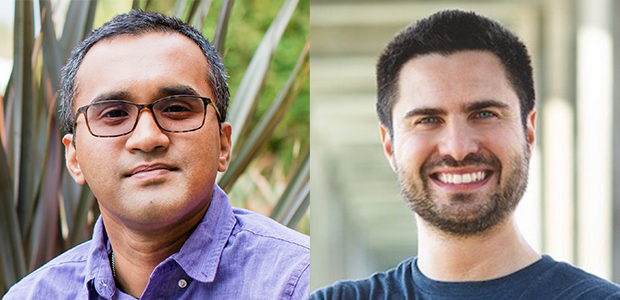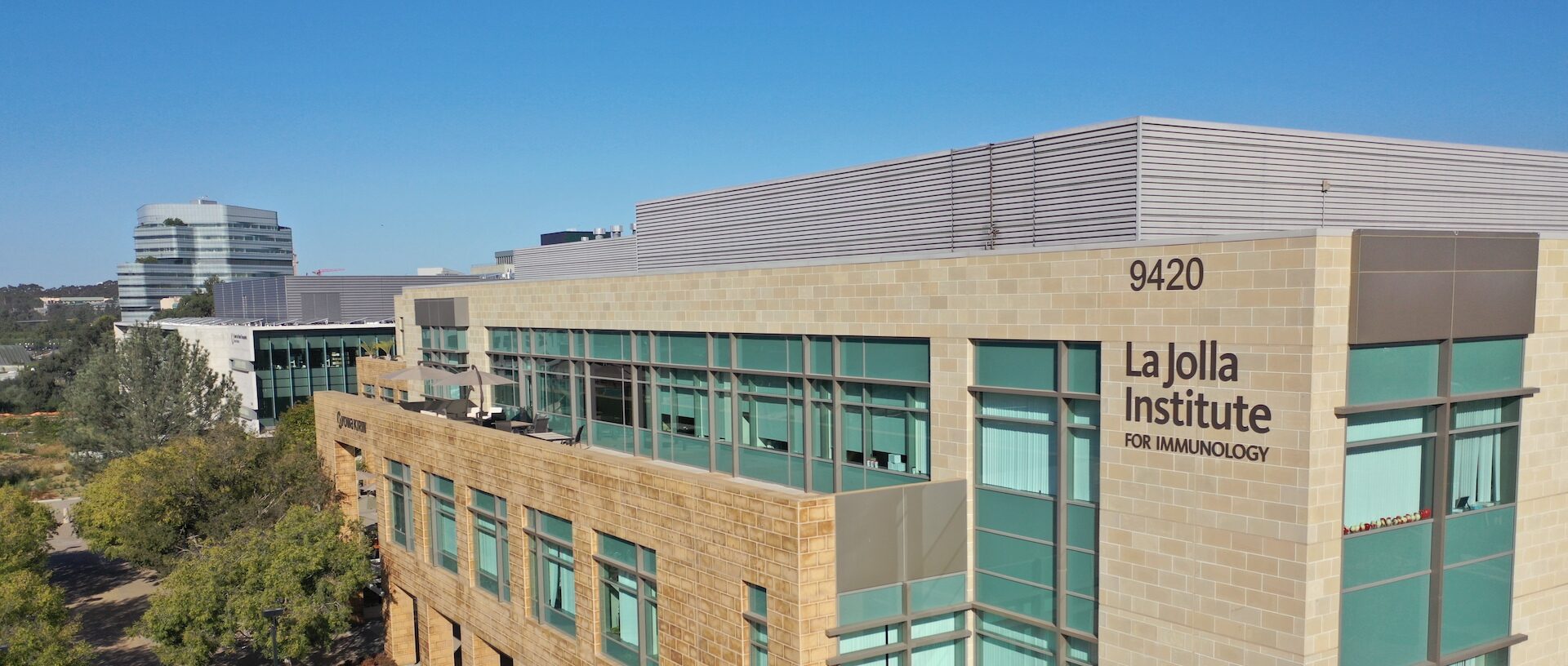LA JOLLA—The Conrad Prebys Foundation has awarded more than $450,000 in funding to support two early-career researchers at La Jolla Institute for Immunology (LJI). LJI Instructor Abhijit Chakraborty, Ph.D., will use the funding to investigate how genomic instability can lead to childhood cancer. LJI Postdoctoral Fellow Marco Orecchioni, Ph.D., will lead a project to uncover how human immune cells may trigger atherosclerosis, the cause of heart attacks and strokes.
“We are honored at La Jolla Institute to be in the first round of recipients of the generosity of The Conrad Prebys Foundation,” says Mitchell Kronenberg, Ph.D., President and Chief Scientific Officer of LJI. “Conrad Prebys was a visionary in so many ways, and his deep understanding of the power of fundamental research to address a wide range of health conditions affecting humanity has been incredibly impactful. With these two projects funded by the foundation, LJI hopes to build on Conrad’s legacy of propelling great scientific ideas forward and as a result, helping many people suffering from disease.”

Abhijit Chakraborty, Ph.D., (left) and Marco Orecchioni, Ph.D., (right).
The Conrad Prebys Foundation works to improve quality of life—primarily in San Diego County—through the distribution of grants to support medical research, healthcare, higher education, and other charitable causes. These new grants carry on founder Conrad Prebys’ legacy of supporting truly innovative research in the health sciences.
“The past year has highlighted the imperative behind-the-scenes work that researchers are conducting to ensure we have the insights, treatments and medicine we need to keep communities healthy,” said Erin Decker, director of grantmaking at The Conrad Prebys Foundation. “The foundation is honored to have a role in ensuring these meaningful research projects have the resources needed to fuel future solutions in medical care.”
For LJI, another exciting aspect of these grants from The Conrad Prebys Foundation is that they are enabling expanded research based on data that Orecchioni and Chakraborty were able to collect thanks to seed-investment grants they won from LJI’s Tullie and Rickey Families SPARK Awards for Innovations in Immunology in 2019 and 2020 respectively. The mission of the Tullie and Rickey Families SPARK Awards program, is to provide $25,000 in private funding for LJI’s young investigators so they can explore novel ideas and hopefully generate promising data that will lead to larger awards that could advance the research and help further their careers.
“Not only are we grateful as an Institute to receive support from the The Conrad Prebys Foundation,” shares Dr. Kronenberg, “I’m also particularly encouraged that these grants represent the realization of the vision of the Tullie and Rickey Families SPARK Awards program, which is to launch bold new ideas of our young researchers. Our donors to the Tullie and Rickey SPARK Awards program can feel proud to see these examples of their support being leveraged ten-fold for both exciting projects thanks to these new awards from The Conrad Prebys Foundation.”
Chakraborty, a member of the Ferhat Ay Lab at LJI, is focused on uncovering how cancer-causing genomic rearrangements make their way into the genome and alter cellular functions. In some cases a person’s genetic material can break apart—become “completely shattered,” he says—and reform in a random fashion, which leads to dangerous rearrangements (a phenomenon called chromothripsis) in the already unstable cancer genome. With the help from his SPARK funding, he has developed methods to identify these significant changes in the human genome.
He now intends to study how such catastrophic rearrangements alter the three-dimensional physical structures of chromosomes and thus affects cellular functions in cancer patients. He will use methods he’s developed to study the effects of iAMP21, a chromosomal rearrangement that leads to a rare but lethal subtype of childhood cancers.
“This is really one of the worst of all the cancers, and we are in the dark,” says Chakraborty.
For the new project, Chakraborty will analyze clinical samples from young cancer patients with iAMP21 conditions and compare those to control samples. This work will shed light not only on where cancer-causing structural variations lurk in the genome but how those rearrangements alter the gene expression pattern leading to the oncogenesis.
Orecchioni, a member of the Klaus Ley Lab at LJI, will pursue new research into how immune cells may drive the development of atherosclerosis, the condition that leads to blocked arteries and causes heart attacks and strokes. He has found that immune cells called macrophages can actually express an olfactory receptor—the same type of receptor that in the nasal passages allows us to smell odors. He has shown that this receptor in mice, called Olfr2, can sense a marker correlated with increased cholesterol in the body and trigger the inflammation seen in atherosclerosis. Blocking the receptor in mice helped stop the disease progression.
“Mice help us understand how things work, but now we need to see if this is the same in humans,” Orecchioni says.
In addition to studying macrophages in human samples, Orecchioni will investigate whether other types of immune cells also express olfactory receptors. He is especially interested in the possibility that immune cells called monocytes could express olfactory receptors and contribute to inflammation. By seeing which cells patrol the body to sense changes in diet, Orecchioni will be a step closer to understanding how new therapies could address the root causes of atherosclerosis.
The new funding from The Conrad Prebys Foundation puts both early-career scientists in a position to make major advances in their fields.
Chakraborty says he can’t wait to get started, especially after a year working outside the lab due to social distancing. “I’m very fortunate,” he says.
Orecchioni says LJI is the perfect place to take on these kinds of high-risk, high-reward projects. “We have fantastic scientists and cutting-edge facilities,” he says. “This environment actually pushes you to try new things.”
About the Conrad Prebys Foundation
About Abhijit Chakraborty’s research
About Marco Orecchioni’s research
###



